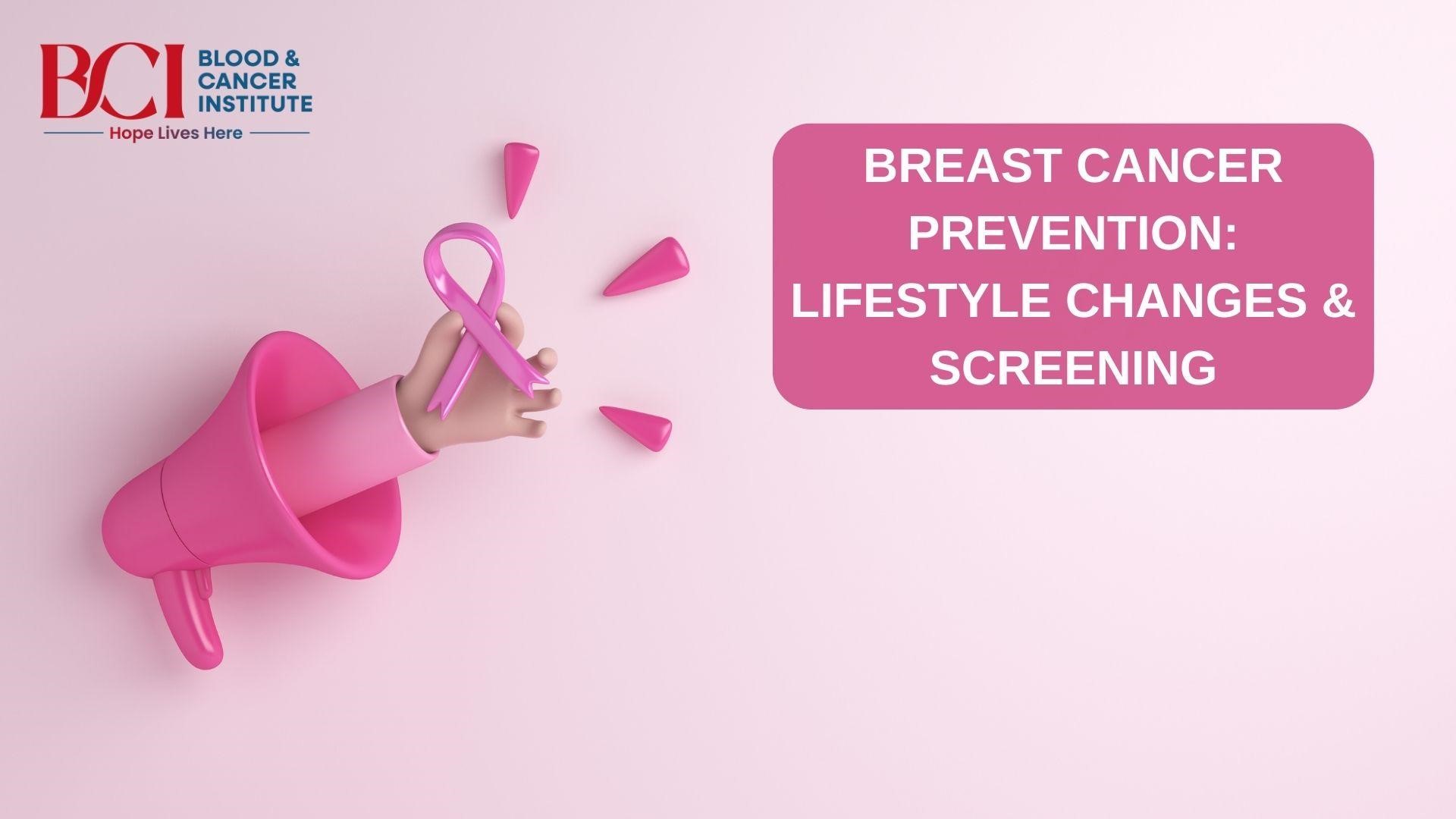
- By : BCI
- General
- Comments: 0
Breast Cancer Prevention: Lifestyle Changes and Screening Recommendations By The Best Breast Cancer Specialist In Surat
Breast cancer remains one of the most common cancers affecting women worldwide. While some risk factors, such as genetics and family history, are beyond our control, there are numerous steps we can take to reduce our risk and detect breast cancer early when it’s most treatable. This blog post curated by our cancer experts at BCI-Blood and Cancer Institute, will explore key lifestyle changes and screening recommendations that can play a crucial role in breast cancer prevention.
Lifestyle Changes for Breast Cancer Prevention
1. Maintain a Healthy Weight
Excess body weight, especially after menopause, has been linked to an increased risk of breast cancer. Fat tissue produces oestrogen, and higher levels of this hormone are associated with a higher risk of certain types of breast cancer. Maintaining a healthy BMI through a balanced diet and regular exercise can help reduce this risk.
2. Stay Physically Active
“Regular physical activity not only helps maintain a healthy weight but also has direct cancer-fighting benefits”, say the cancer specialists in Surat. Aim for at least 150 minutes of moderate-intensity exercise or 75 minutes of vigorous-intensity exercise per week. Activities like brisk walking, cycling, swimming, or dancing can all contribute to reducing breast cancer risk.
3. Limit Alcohol Consumption
Alcohol consumption, even in moderate amounts, has been linked to an increased risk of breast cancer. If you choose to drink, limit yourself to no more than one alcoholic beverage per day. For those at higher risk, consider avoiding alcohol altogether.
4. Eat a Nutrient-Rich Diet
A diet rich in fruits, vegetables, whole grains, and lean proteins can help reduce breast cancer risk. These foods provide essential nutrients and antioxidants that support overall health and may have cancer-fighting properties. Limit processed foods, red meat, and saturated fats, which have been associated with increased cancer risk.
5. Breastfeed, If Possible
For women who have children, breastfeeding has been shown to have protective effects against breast cancer. The longer the duration of breastfeeding, the greater the potential benefit.
6. Avoid Hormone Replacement Therapy
Doctors from Blood and Cancer Institute, one of the best cancer hospitals in Surat, advise against the use of hormone replacement therapy since long-term use of combined oestrogen-progestin hormone replacement therapy (HRT) has been associated with an increased risk of breast cancer. If you’re considering HRT for menopausal symptoms, discuss the risks and benefits with your healthcare provider and explore alternative options.
7. Manage Stress
While the direct link between stress and breast cancer is not fully understood, chronic stress can lead to unhealthy behaviours and weaken the immune system. Practice stress-reduction techniques such as meditation, yoga, or deep breathing exercises to support overall health and well-being.
8. Avoid Smoking
Smoking is linked to an increased risk of many cancers, including breast cancer, particularly in younger, premenopausal women. If you smoke, seek support to quit. If you don’t smoke, don’t start.
Screening Recommendations for Early Detection
Early detection of breast cancer significantly improves treatment outcomes. Here are the current screening recommendations for women at average risk:
1. Breast Self-Awareness
While formal breast self-exams are no longer universally recommended, being familiar with your breasts’ normal look and feel is important. Report any changes, such as lumps, skin changes, or nipple discharge, to your healthcare provider promptly.
2. Clinical Breast Exams
Many healthcare providers recommend clinical breast exams every 1–3 years for women in their 20s and 30s, and annually for women 40 and older. These exams, performed by a healthcare professional, can help detect any abnormalities.
3. Mammograms
- Women aged 40–44: Have the option to start annual mammograms if they choose to do so.
- Women aged 45–54: Should get mammograms every year.
- Women 55 and older: Can switch to mammograms every two years or continue yearly screening.
4. Additional Screening for High-Risk Women
Women at higher risk due to family history, genetic factors, or other reasons may need to start screening earlier or have additional tests such as breast MRI. Consult with your healthcare provider to determine the most appropriate screening plan for your individual risk profile.
Conclusion
While there’s no guaranteed way to prevent breast cancer, adopting these lifestyle changes and following recommended screening guidelines can significantly reduce your risk and improve the chances of early detection. Early detection and seeking timely cancer treatment in Surat will increase the positive outcome of your diagnosis. Remember, each woman’s risk factors and health profile are unique. Regular consultations with your healthcare provider can help you develop a personalized prevention and screening plan tailored to your needs.
